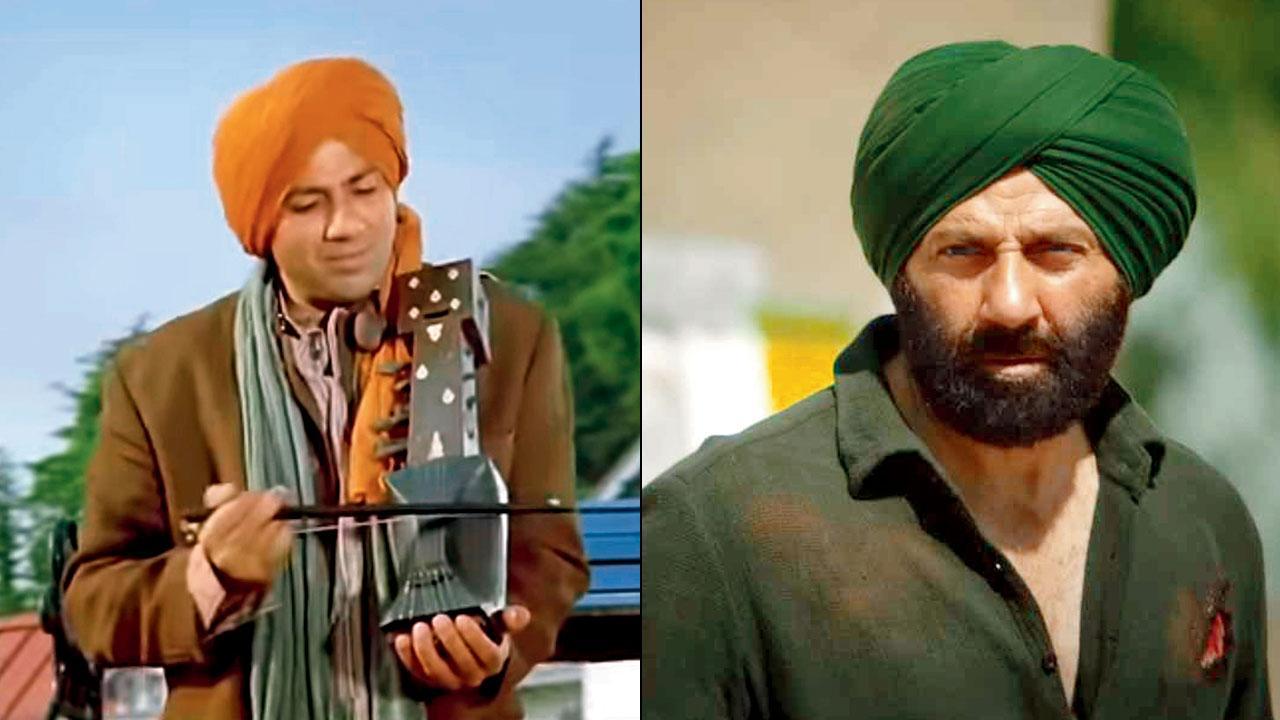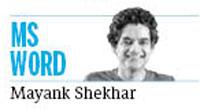Audiences never abandoned the onscreen angry man (young or old); only the cinemas did

Sunny Deol in Gadar: Ek Prem Katha (2001) and its recently released sequel
 A conversation between Dev Anand and Indian Army’s General Pargat Singh at Nathu-la Pass, during the making of Jewel Thief (1967), led to the creation of which popular trope in Hindi movies, first used in Anand’s film, Prem Pujari (1970)?’
A conversation between Dev Anand and Indian Army’s General Pargat Singh at Nathu-la Pass, during the making of Jewel Thief (1967), led to the creation of which popular trope in Hindi movies, first used in Anand’s film, Prem Pujari (1970)?’
ADVERTISEMENT
That’s a quiz question I set after reading Balaji Vittal’s book, Pure Evil: The Bad Men of Bollywood. I won’t ask it at a trivia night anymore, since have written it down here! Answer?
‘Pakistan—as the Bollywood villain!’ Shatrughan Sinha was Pak Army colonel, in Prem Pujari, first film he signed up for. Sinha went on to play several villainous parts, thereafter—also did the cigarette-to-lip jugglery onscreen, which became Rajnikanth’s trademark, later.
What’s the most successful film, with Pakistan, as the unifying villain? Doubtlessly, Anil Sharma’s Gadar (2001). That, in terms of footfalls (five crore plus), fared better than Ramesh Sippy’s Sholay (1975). Or so folks in Bollywood wouldn’t tire of educating me, when I began reporting on the beat in Bombay.
Also, that Gadar was the last film to crack both small towns and big cities at the box-office, when the split between the two audiences, namely, multiplexes and single-screens, was growing wider. 22 years later, Gadar 2 (2023) appears to have done the same.
As you watch the film with a crackpot Pak Army villain, General Hamid Iqbal (Manish Wadhwa), who’s sworn to “Ghazwa-e-Hind (holy raid of India)”, because he lost his own family to “vibhajan mein hue gadar (revolts during Partition).”
Hence, he places Bhagwat Gita and Koran, before a Hindu man to be guillotined, basis which book he literally heads towards. The narrator, in the picture’s prologue, similarly weighs in on “Hinduon ke liye nafrat, Hindustaniyon ke liye nafrat (hate towards Hindus, Hindustanis)” from across the border.
The great Indian, Tara Singh (Sunny Deol)—himself married to a Pakistani, Sakina (Ameesha Patel), very much a practising Muslim—offers the sobering counterpoint: “Even the people of both countries want peace; what’s up with the politics?” Making it unambiguously clear: “India belongs to all religions.”
The first Gadar was roughly inspired by the Ramayan, wasn’t it—Ram, rescuing Sita, from Lanka. The second seems closer to Abhimanyu’s Chakravyuh from Mahabharat, wherein Tara’s son (Utkarsh Sharma) infiltrates Pakistan, but gets caught in the whirlpool. Prompting his Papa to pull him out. Both films written by Shaktimaan Talwar.
What’s common to the two is, of course, the metal handpump that Tara merely stares at, and hundreds/thousands of Pakistanis run for cover. Although there’s nothing to beat the climax sequence, set in a mosque, that doubles up as a military establishment, with a full battalion, loaded with canons and machine guns, firing at the hero. Nothing can touch Tara.
None of it makes sense. What to make of it, ideally with a wild crowd in cheap, front-row seats, of a reasonably priced multiplex, over a packed midnight show? Who do you attribute this leap of [Hindu-Muslim] faith to?
Obviously, the working-class, action hero, that audiences can convincingly repose their faith on—a commodity that Hindi movies stopped suitably manufacturing since the ’90s. That’s Sunny Deol, 66, at the centre, still.
Although the last time I met Deol, in 2019, he reminded me that Gadar, as in the title, was ‘Ek Prem Katha’ (a love story). And that throughout his career, he’s been attracted to “vulnerable characters, pushed to the brink,” which is when the heroism reveals itself. Fair enough—Ghayal (1990), or Ghatak (1996), no different from Gadar; no?
He also said that he was deeply drawn to Sylvester Stallone—the reason his son (Karan) is nicknamed Rocky. Love for Stallone is something he shares with Salman Khan, who told me once that “heroism in movies must equal people flexing their imaginary muscles, on their way out of the cinema.”
Even when Deol was less ‘massy’, in terms of, literally, body-mass—after his breakout romantic debut, Rahul Rawail’s Betaab (1983)—he bet his career on Rawail’s Arjun (1985). Written by Javed Akhtar, of Salim-Javed, who had similarly scripted the ‘angry young man’ for Amitabh Bachchan in the ’70s.
Deol said he’d signed up for no other film then, which was such an anomaly in the ’80s, that he had a hard time fetching co-actors’ dates. Arjun tanked (if you’ll excuse the pun). Akhtar regretted this. It remains a cult film. Deol rediscovered his image in time. Gadar (2001) was its peak.
By 2019, Deol was in the mood to crib about Bollywood’s corporate firms, who weighed creativity on balance-sheets, and that he felt his director, Sharma, had the sense of scale: “I just don’t know what people want anymore.”
Gadar was one of Zee Telefilms’ first productions. Gadar 2 is the same team together. I guess it’s called conviction, when a full-on masala movie works—and that ‘people have moved on, if it doesn’t!
The astounding success of Gadar got linked to a ‘post-Kargil phenomenon’. Just as Salim-Javed’s ‘angry young man’ was diagnosed as catharsis of India’s disillusioned, jobless, young—even the before- and after-effect of Emergency, if you may!
Much as I enjoy such analyses, perhaps it’s always been about that perfect alchemy of raw action, emotions (love, rage), and a relatable, working-class hero—love for none of which left audiences. Only those movies did.
Mayank Shekhar attempts to make sense of mass culture. He tweets @mayankw14
Send your feedback to mailbag@mid-day.com
The views expressed in this column are the individual’s and don’t represent those of the paper.
 Subscribe today by clicking the link and stay updated with the latest news!" Click here!
Subscribe today by clicking the link and stay updated with the latest news!" Click here!








